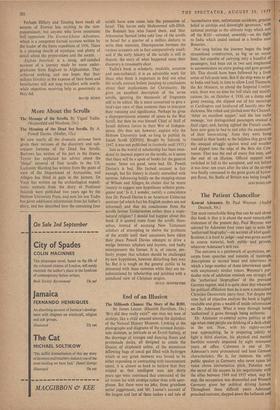More About the Scrolls
The Message of the Scrolls. By Yigael Yadin. (Weidenfeld and Nicolson, 21s.)
The Meaning of the Dead Sea Scrolls. By A. Powell Davies. (Muller, 15s.) By now nearly all the dramatis persona, have given their versions of the discovery and sub- sequent fortunes of the Dead Sea Scrolls. Burrows has written of his part in the drama; Trevcr has explained his advice about the `illegal' removal of four scrolls to the US; Lankester Harding has written from the point of view of the Department of Antiquities, and Allegro has filled in gaps in the picture; De Vaux has written up his archaeological expedi- tions; extracts from the diary of Professor Sukenik were published two years ago by the Hebrew University Press, and now his son Yadin has given additional information from his father's diary, and has described how the remaining four
scrolls have now come into the possession of Israel. This leaves only Muhammed adh-Dhib, the Bedouin boy who found them, and Mar Athanasius Samuel (who sold four of the scrolls to Israel for a quarter of a million dollars) to write their memoirs. Discrepancies between the various accounts are in fact comparatively small; and if the early history of the scrolls is still in dispute, the story of what happened since their discovery is reasonably clear.
Yadin's book is scholarly, readable, accurate and non-technical; it is an admirable work for those who think it important to find out, what the scrolls contain before jumping to conclusions about their implications for Christianity. He gives an excellent description of the seven scrolls, ignoring the thousands of fragments still to be edited. He is more concerned to give a bird's-eye view of their contents than to interpret their meaning and significance. Perhaps he gives a disproportionate amount of space to the War Scroll, but then he was himself Chief of Staff of Israeli defence forces in their War of Indepen- dence. (He does not, however, explain why the Hebrew University took so long to publish its Isaiah Scroll [QDSIb]. Bought by Sukenik in 1947, it was not published in facsimile until 1955.)
Just as the world of scholarship has been inun- dated by learned papers on the scrolls, so it seems that there will be a spate of books for the general reader. Some are good, some bad. Dr. Powell Davies's is bad. His factual account is fair enough, but his history is closely enmeshed with surmise. Advancing boldly on the stepping-stones of Wilson and Allegro, he claims that he wants 'merely to suggest new hypotheses withtlut prota- gonist zeal.' Is it, I wonder, merely a coincidence that Dr. Powell Davies is an American Unitarian minister (of which fact his English readers are not informed) and that his conclusions from the scrolls favour Unitarianism rather than a super- natural religion? I should feel happier about this book if it quoted more from the scrolls them- selves, instead of accusing New Testament scholars of attempting to shelve the problems of the scrolls until their successors have taken their place. Powell Davies attempts to drive a wedge between scholars and laymen, and badly misrepresents the former. It is, of course, per- fectly proper that scholars should be challenged by new hypotheses, however disturbing they may be. But it is tough on the general public to be presented with these surmises while they are un- substantiated by scholarship and jumbled with a jaundiced view of Christian origins.
HUGH MONTEFIORE






























 Previous page
Previous page